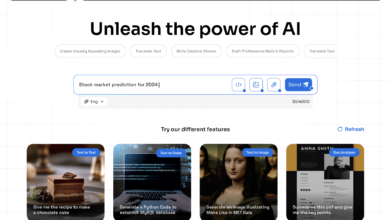AI to Disrupt Online Business Economy

The Gist
- AI disruption. Generative AI is reshaping online business models, causing widespread disruption.
- Monetization shift. Traditional web monetization methods face challenges from AI’s rise.
- New models. Replacing ad dollars with agent fees is complex, requiring new models.
As generative AI products ingest more of the web — via deals like OpenAI’s with Vox and The Atlantic recently — the impact could be felt well beyond news publishers.
“Chaos” is en route for the broader online economy, VC Joe Marchese of Human Ventures texted me, with the technology poised to reshape a decades-old system of online referrals and business building.
Marchese sold his ad tech firm, TrueX, to 21st Century Fox, and ran advanced advertising at Fox Networks for years, so he knows the system better than most. After his “chaos” text, I called him up to ask him what he meant. Here’s our (brief) conversation:
Internet Business Models Facing Chaos
Alex Kantrowitz: Why is “chaos” coming for the business model of every business on the internet, as you texted?
Joe Marchese: The web is an infrastructure built on paying for, or optimizing for, referred traffic, and the ability to monetize people once they get to a webpage. If that changes in any way, it’s not just publishers who are going to feel massive shifts in their business models, but online travel, ecommerce and every sector that’s built on the pipes of the internet.
Related Article: OpenAI Wants to Get Big Fast, and 4 More Takeaways From a Wild AI Moment
AI Disrupting Online Ad Revenue
Kantrowitz: How would that play out in online advertising, for example?
Marchese: The vast majority of online advertising is built on top of search. Click on a link, get a fee, create a value chain. Or it’s impression based: Someone goes to a web page, is served an impression, an advertiser is charged. Even if generative AI is not going to collapse that tomorrow, if it causes a 10% or 20% decrease in that, imagine what it means for something that’s basically the size of the internet.
Related Article: Will Search Be Generative AI or Blue Links? Actually It’s Both
Generative AI’s Challenge: Replacing Ad Dollars
Kantrowitz: But the conventional wisdom is that, instead of ad dollars, generative AI companies will get an agent fee for introducing you to new services or new information. Would that work as a replacement?
Marchese: It’s very difficult to pull off. In theory, the agent fee could replace the click through and tracking to purchase. But there are so many companies involved at each step today. You might be able to replace that, but you would need a new model, and it doesn’t exist yet.
Related Article: Generative AI Might Be Slamming Right Into a Resource Wall
Travel Brokers Face AI-Induced Chaos
Kantrowitz: What about traditional online businesses like Kayak-style travel brokers? How will they end up in chaos?
Marchese: One of the most valuable searches is people looking for things to do. In this case, the layer between the large language model and the consumer is very, very important. I don’t want to ask ChatGPT what to do in Rome. But I would ask Conde Nast Traveler. That is a massive opportunity, but you’ve just removed an entire industry that’s fighting over search engine results so they can give you flight answers and get a piece of the revenue. If you look at the value chain potentially contracting, there will be new business models for it. But they’re not built yet.
Related Article: Google’s AI Narrative Is Starting to Flip
Startups Face Brand-Building Challenges Online
Kantrowitz: Startups also use this online referral system to build userbases. What happens to them?
Marchese: The best use of performance marketing is always early because your customer acquisition cost is lowest at the beginning. Google, Facebook and Amazon are great at finding you the most likely earliest users. But as companies try to scale, there’s a need to build a brand. If consumers don’t got to websites and see ads, it’ll be very hard to build that brand. Mediums that are less disrupted, like billboards — which I’m a huge fan of — will become more valuable.
Generative AI Disruption: Good or Uncertain?
Kantrowitz: Isn’t this all good disruption? A lot of the industry we’re talking about is exploiting inefficiencies and not being very productive.
Marchese: If you’re not paying, then you are the product in a lot of cases, and consumers were never paying for the internet. So the internet found a way to make money off them. You might be paying for generative AI, and that would allow generative AI to deliver you the best recommendations — not recommend who paid the most. That’s good in theory, but we don’t know what we don’t know. Are the models taking sides? Black boxes are hard.
AI Integration Shaking Up Online Platforms
Kantrowitz: Aren’t we getting a bit ahead of ourselves? The latest press releases still have ChatGPT at 100 million users, the number it hit two months after launch.
Marchese: I don’t think so. It’s not just ChatGPT, it’s the largest platforms in the world. Google and Facebook are putting this into everything. If you’re in WhatsApp, there’s an AI there to talk to. Gemini might’ve suggested the number of rocks you should eat because it ingested some Onion articles. That’s fine. It just rolled out. This stuff’s going to get better. For the most mundane searches — travel, health questions, etc. — there were basically entire sites and infrastructure set up to be those top search results. That’s all getting synthesized. That’s a big deal.



